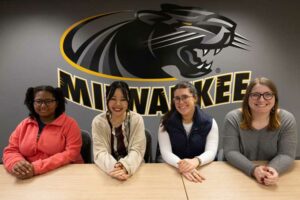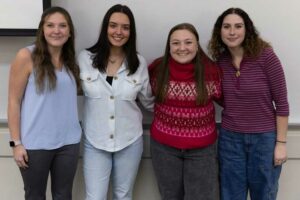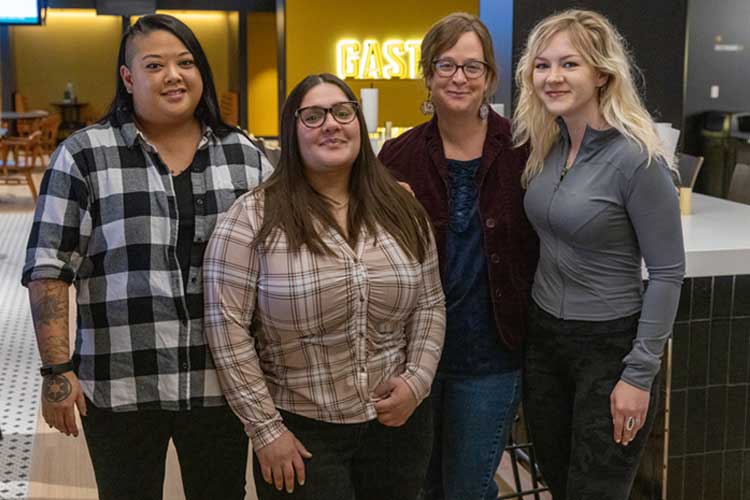By Kathy Quirk
Photos by Troye Fox
Is criminal justice as exciting as it looks on TV— full of car chases and shoot outs? Do all older people develop dementia? How can social workers collaborate with police departments to prevent drug overdoses?
Student associations offer students a chance to learn more about the reality of their chosen fields.
The Helen Bader School of Social Welfare has three student associations that sponsor activities and workshops, offering opportunities to learn and network with professionals in their fields. The groups are also a source of support for students as they plan their future careers.
Student groups at HBSSW:
- Criminal Justice Student Association
- Student Social Work Association
- Student Gerontology Association
“I think one of the premises of the Criminal Justice Student Association is that we care about immersive learning,” said Lily Bretl, the group’s president. “Our emphasis is on connecting criminal justice students with local agencies and practitioners.”
The student groups meet regularly and plan events to engage other students, not only in majors but in other related fields.

Katie Fisher, secretary; Cara Charles, vice president. Not pictured:Jen Kahn-Pettigrew, faculty advisor.
For example, the Student Gerontology Association recently held a workshop on aging with Karyn Frick, distinguished professor of psychology and director of the Neuroendocrinology of Memory Lab, and Caitlin Bowman, assistant professor of psychology and director of the Cognition, Aging and Brain Imaging Lab. The two shared the latest research on memory and aging with the students.
The gerontology group is also partnering with others on and off campus for “Artistic Representations of Aging,” an art and photo show with a film about older adults on April 19 starting at 4:30 p.m. in the Union Ballroom East.
In the fall semester, the Criminal Justice Student Association held a session on careers in criminal justice, with a focus on the field of crime analysis. Experts, many of them alumni, from the Milwaukee Police Department’s Fusion unit and other Wisconsin agencies talked to students about their work.
“We had really good feedback,” said Bretl. “People were engaged and asked a lot of good questions. I was able to talk to one of my peers who is interested in crime analysis and that really affirmed what she wants to do.”
“Everybody thinks they know about it because of what they see on TV, but bringing in guests from these fields shows what it is truly like and gives students knowledge about what they could be doing in the future,” said Kaitlyn Fowlie, the group’s vice president.
The group works closely with the UWM Police Department to encourage and promote student attendance at the workshops and trainings the department offers. The student group also collaborates with the FBI Outreach to College and University Students (FOCUS) group.
The Student Social Work Association held a workshop on LGBTQIA+ communities in November, focused on students who might be interested in the social work major.
And the Social Work and Criminal Justice groups collaborated on a Narcan training and harm reduction event in November to help students understand the ways these two professions can work together on drug addiction issues.
Students who power groups chose majors for various reasons.
Lexy Lunger, the president of the Student Social Work Association, made a pivot from a former career as a tattoo artist. She is combining her social work degree with women’s and gender studies. She became involved in working with the queer community during the pandemic and recognized the lack of resources in that community. “I wanted to work with the LGBTQIA+ populations.”
She chose UWM, even though she’s originally from Hawaii, because this is the city she wants to work in.
Dariliss Nieves, the Student Social Work Association’s treasurer, started out in mechanical engineering, but in working with other students of color who needed help, realized, she said, that she wanted a career focused on helping people.

Lily Bretl, president; Adderley Finley, social media coordinator. Not pictured: Rachel Nass, membership coordinator; Olivia Olson, secretary; Kimberly Hassell, faculty advisor.
Bretl was inspired to go into criminal justice by a middle school history teacher, and a high school field trip to the Green Bay Correctional Institute. The trip was part of an initiative the facility was running at the time to educate students. “It provoked me and inspired me to really want to make a change in the criminal justice system because every single person there had a lot of trauma in their upbringing.”
Helping care for her aging grandparents sparked Ra’shida (Sadie) Rockette’s interest in gerontology, she said. She is president of the Student Gerontology Association and a psychology major.
All three of the student associations bring in students from a variety of majors and minors, but the gerontology group, in particular, attracts students from diverse backgrounds and interests who may be interested in working with aging populations, according to Rockette.
In addition to programs and support for campus partners, the members of the student groups support each other in their chosen major. Learning opportunities are part of what the organizations do, but there are also social events.
“We rely so much on each other,” said Zoe Kearney, vice president of the social work student group. “We have a sense of belonging when we advocate and advance as a group. There’s a contagious energy.”
